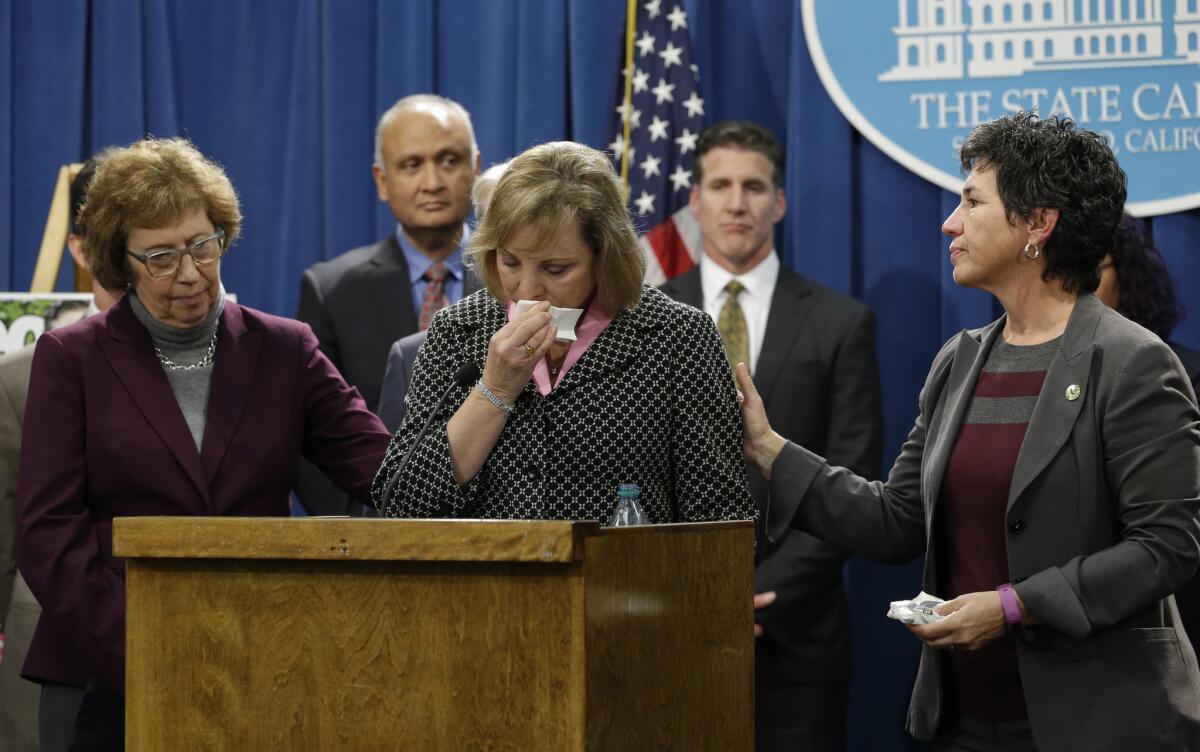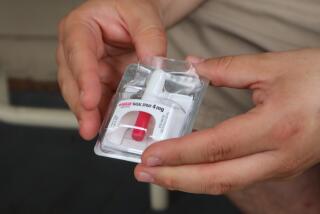California physicians end opposition to aid-in-dying bill

Debbie Ziegler, center, the mother of Brittany Maynard, is comforted by state Sen. Lois Wolk (D-Davis), left, and Assemblymember Susan Talamantes Eggman (D-Stockton) as she appeared in January in support of proposed legislation allowing doctors to prescribe life-ending medication to terminally ill patients. Maynard, a 29-year-old San Francisco Bay Area woman who had terminal brain cancer, ended her own life.
- Share via
Reporting from Sacramento — The California Medical Assn. on Wednesday withdrew its opposition to a bill that would allow physicians to prescribe lethal doses of drugs for terminally ill patients who want to hasten their deaths.
The group said it was the first state medical association in the nation to be neutral on an aid-in-dying bill.
Some physician groups remain opposed to assisted death. But the CMA opposition had been seen as a major obstacle to approval of the measure pending in California.
“The decision to participate in the End of Life Option Act is a very personal one between a doctor and their patient, which is why CMA has removed policy that outright objects to physicians aiding terminally ill patients in end-of-life options,” Luther F. Cobb, a physician and president of the CMA, said in a statement.
“We believe it is up to the individual physician and their patient to decide voluntarily whether the End of Life Option Act is something in which they want to engage,” the statement said. “Protecting that physician-patient relationship is essential.”
Cobb said the association remained committed to providing patients the best healthcare possible. But he added, “Despite the remarkable medical breakthroughs we’ve made and the world-class hospice or palliative care we can provide, it isn’t always enough.”
Not all physicians agree with the CMA. The proposal is still opposed by the Northern California Oncologists and the Medical Oncology Assn. of Southern California.
“No amendments can change the fact that ‘an act that directly causes the patient’s death’ is contrary to the role of the physician,” those two groups said in a statement.
“We feel that better palliative care efforts can improve end-of-life care when death is inevitable, without the guilt and ethical dilemma” engendered by the pending bill, the groups said.
In 1987, the CMA House of Delegates decided to oppose enactment of any law that would require a physician to provide medicine, technique, advice or referrals necessary for a patient to pursue to end his or her life.
California lawmakers have twice rejected aid-in-dying measures since then.
Amendments have been proposed for the current bill, SB 128 by Democratic state Sens. Bill Monning of Carmel and Lois Wolk of Davis, that would give physicians freedom not to prescribe medication to hasten the end of patients’ lives or to even educate their patients about such options.
The measure must still clear a state Senate committee and the Senate floor before going to the Assembly for consideration.
“As the authors of SB 128, we are pleased to learn that the medical community is making a historic shift from a previous position on this issue,” Wolk said.
More to Read
Sign up for Essential California
The most important California stories and recommendations in your inbox every morning.
You may occasionally receive promotional content from the Los Angeles Times.











